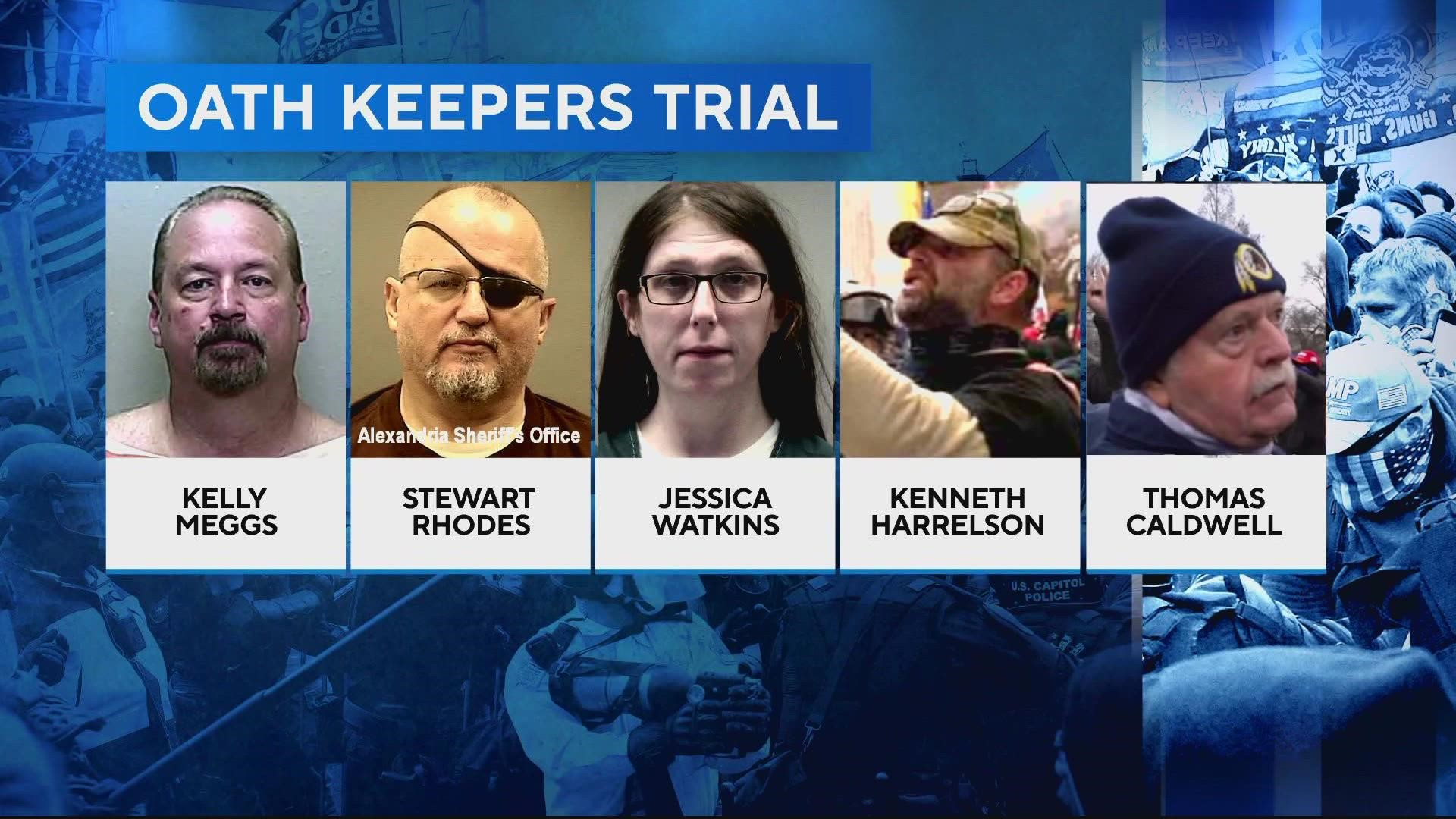WASHINGTON — If the Oath Keepers conspired to commit insurrection on Jan. 6 then they were comically inept at doing so, an attorney for militia leader Stewart Rhodes argued before a jury Friday.
James Lee Bright, one of three attorneys representing Rhodes at trial against charges of seditious conspiracy, presented his closing arguments Friday after seven weeks of testimony in the case. Rhodes and four co-defendants were indicted in January on a rarely used charge of seditious conspiracy, among other counts, for an alleged plan to stop the transfer of presidential power after the 2020 election.
At the beginning of the case, Assistant U.S. Attorney Jeffrey Nestler compared Rhodes to a “general overlooking a battlefield” on Jan. 6. For weeks, prosecutors have sought to show Rhodes repeatedly called for armed revolution against the government in the wake of former President Donald Trump’s loss – priming the followers who heeded his call to D.C. to enter the U.S. Capitol Building at his command. The Justice Department says that command came both in the form of group messages from Rhodes, particularly one reading, “The patriots are taking things into their own hands,” as well as a 90-second call between Rhodes, Florida state leader Kelly Meggs and Oath Keepers operations leader Michael “Whip” Greene. Minutes after that call, Meggs led a stack of a dozen Oath Keepers through the Columbus Doors on the east side of the Capitol.
The five defendants on trial, and their attorneys, have denied there was any plan in place to enter the building or to oppose the government. Attorneys have argued repeatedly that the massive crowd at the Capitol had degraded cell reception to the point calls and messages weren’t going through – including the three-way call with Rhodes, Greene and Meggs. As a result, Bright argued Friday, Rhodes had little idea of where other Oath Keepers were once the riot started.
“That’s the worst coordination any general has ever had,” Bright said. “He didn’t even know where his troops were.”
Bright, who joined the case in January alongside fellow Dallas-based attorney Phillip Linder after Rhodes’ indictment, told jurors they had been misled into believing the Oath Keepers’ presence in D.C. during pro-Trump events in November and December 2020 were “dry runs” for what would eventually transpire on Jan. 6. He said when, days after the election, Rhodes shared the so-called “Serbian Plan” describing how the presidency of Slobodan Milošević was overthrown, he could not have any idea of what would happen in D.C. two months later.
“I get that Mr. Rhodes is really smart,” Bright said. “He’s probably smarter than me and most of the people in here. But he’s not Nostradamus.”
And most importantly, Bright said, all of the rhetoric jurors had seen from Rhodes and his co-defendants – even the violent calls for “bloody revolution” – amounted to nothing more than “venting.”
“Yes, things were said,” Bright said. “It was heated rhetoric. Horribly heated rhetoric. Bombast. Inappropriate. But that is not indicative of an agreement, of a meeting of the minds.”
Two stacks of Oath Keepers did enter the building on Jan. 6 – going “off-mission,” Rhodes said when he took the stand in his own defense – but many more stayed outside. Those who didn’t enter included combat veterans Greene and Wyoming resident Lee Maddox. Bright suggested that not sending in his most capable militia members, or calling in the quick reaction force stationed in Northern Virginia, was clear evidence Rhodes didn’t intend to disrupt the certification.
"If, for the first time in 209 years, the Capitol is breached and you don't take the opportunity to call in your QRF?" Bright said. "You're either the Keystone Cops of insurrectionists, or there's no insurrection There's no in-between on this."
The government’s closing arguments were delivered Friday by Assistant U.S. Attorney Kathryn Rakoczy. Over two hours, Rakoczy summarized the hundreds of exhibits, photographs, messages and videos jurors had seen over the previous seven weeks and said the testimony Rhodes and Greene gave on the stand was self-serving and contradictory – particularly when it came to the Jan. 6 three-way phone call between the two men and Stack 1 leader Meggs. Rakoczy said jurors had heard for weeks, including from Rhodes himself and other Oath Keepers, about the hierarchical nature of the organization.
“Does it make sense that any of these people would go into the Capitol, breach the building, without checking in with the commander?” she said. “Ask yourself when you assess that phone call.”
Prosecutors and the attorneys for Rhodes and Meggs all completed their closing arguments Friday. The remaining defendants – Kenneth Harrelson, Jessica Watkins and Thomas Caldwell – were expected to present theirs to the jury Monday morning, followed by the DOJ’s rebuttal arguments.
We're tracking all of the arrests, charges and investigations into the January 6 assault on the Capitol. Sign up for our Capitol Breach Newsletter here so that you never miss an update.

